About


About NMLLEN
Working With Our Community To Build a Better Future
Northern Mallee LLEN, is a not-for-profit organisation works closely with schools, students, and the industry to identify gaps in education and training, provide advice on local and state-wide policy issues at both the strategic and operational level and broker cross sector partnerships to better support young people.
Funded by the State Government, Northern Mallee LLEN is one of the 31 LLENs across Victoria that were established in 2001 with the objective of improving career pathways for young people. Northern Mallee LLEN engages with industry and schools to provide schools with access to quality Work Based Learning (WBL) opportunities that meet the needs of local students and industry. This includes Structured Workplace Learning Placements (SWL), Work Experience (WE), and School Based Apprenticeships and Traineeships (SBATs).
NMLLEN also undertakes a range of school industry engagement activities such as Guest speakers presentations, Workplace visits, industry tours, Work-readiness or life skills programs (where these activities involve industry or employers), multi-school events involving employers and industry representatives and provides support for place-based planning for Vocational Education Training Delivered Secondary Students (VETDSS) for the Victorian Certificate of Education (Vocational Major).
Our Mission
Facilitating strategic partnerships with stakeholder groups, to improve outcomes in education, training and employment for young people.
Our Vision
Career pathways leading to education, training and employment.
Northern Mallee LLEN Region
Situated in North-West Victoria, the Northern Mallee Local Learning & Employment Network (NMLLEN) region covers almost ten per cent of the State. NMLLEN encompasses all of the Mildura Rural City Council Local Government Area as well as the township of Robinvale (Swan Hill Rural City Council LGA).
NMLLEN acknowledges that it is situated on and incorporates the traditional lands of the Latji Latji people and their neighbours the Barkindji people, who have been custodians of this land for thousands of years. Accordingly, NMLLEN pays its respect to the traditional owners and Elders past, present and emerging.
The region offers a broad range of educational facilities including pre-schools, primary schools, secondary schools, TAFE campuses and La Trobe University campus Mildura and Monash Rural Health Mildura.
Secondary Schools In Our Region
- Chaffey Secondary College
- Henderson College
- Irymple Secondary College
- Merbein P-10 College
- Mildura Christian College
- Mildura Senior College
- Mildura Specialist School
- Murrayville Community College
- Ouyen P-12 College
- Red Cliffs Secondary College
- St Joseph's College
- Trinity Lutheran College
- Werrimul P-12 School
- Indie School Mildura
- Robinvale College
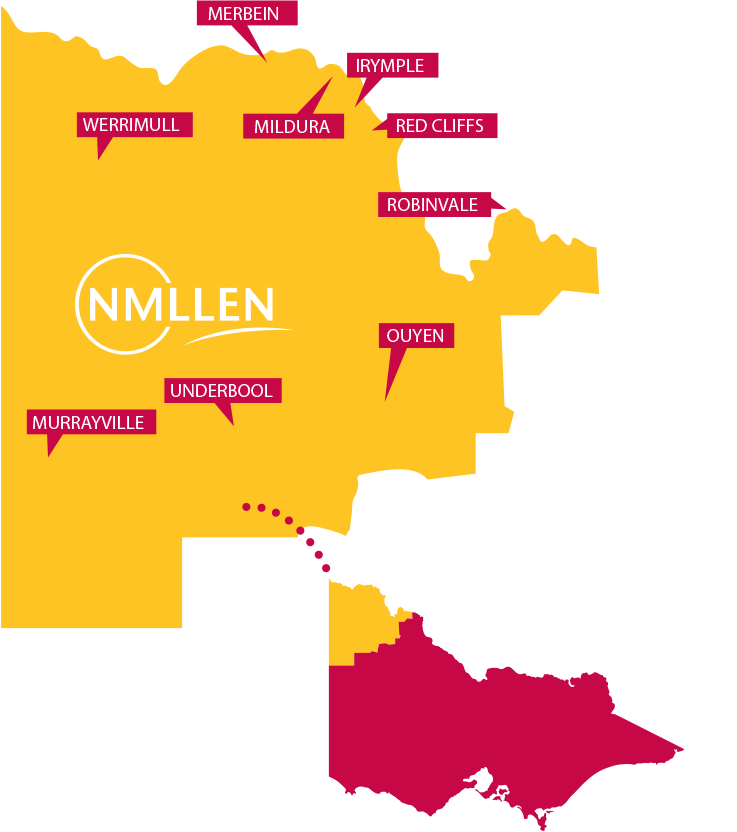
NMLLEN Strategic Plan (2020-2023)
Goal 1: Strengthen Education, Vocational and Training Pathways leading to employment for young people:
Objectives:
- Increase opportunities for structured workplace learning, school based. apprenticeships, traineeships and Work Experience for local students.
- Strengthen pathway opportunities for young people.
- Advocate for improved pathways to employment for young people.
- Increase opportunities for young people to be engaged in STEM.
Strategies:
- Implement an Annual Structured Workplace Learning work plan.
- Engage with schools to ensure that students are aware of the benefits of structured workplace learning.
- Work actively with schools to develop flexible work experience models for students.
- Map current student volunteerism through cooperation with secondary schools in the region.
- Develop student volunteering processes in conjunction with industries and partners, to ensure that students can utilise this information in employment and future education applications.
- Identify, develop and promote pathways opportunities for education and employment in the region.
- Utilise the regionally aggregated Morrisby Year 9 student data careers assessment tool, to strengthen pathways for young people.
- Investigate and develop effective partnerships to implement the future Victorian Youth Employment Strategy.
- Continue lobbying efforts for the establishment of a Tech School for this region.
- Conduct an Industry Roundtable opportunity within the region to bring schools and industry together, for coordinated training and employment outcomes.
- Continue to develop the partnership with schools and industry that creates student engagement with STEM and STEM-related pathways.
Goal 2: Strengthen support for disengaging and disengaged young people
Objective:
- Improve opportunities for disengaged or disengaging young people to re-engage back into education or training.
Strategies:
- Maintain, monitor and evaluate the effectiveness of the Navigator program.
- Investigate innovative partnerships and/or programs for disengaged or disengaging young people, utilising alternative funding sources.
- Investigate the potential of coordinating an industry/student mentoring program.
Goal 3: Achieve better awareness of local youth participation and engagement in education, training and employment
Objectives:
- Collect and disseminate to stakeholders local data on young people in education, training and employment.
- Raise awareness of the role of NMLLEN in improving opportunities for young people in education, training and employment.
Strategies:
- Deliver the Engaging Parents in Career Conversations program across the NMLLEN region.
- Advocate for, and utilise the updated Mallee Skills Commissioner Report in education, training and employment planning.
- Investigate new technologies for educating and skilling students on education, training and employment opportunities.
- Collect and disseminate local data on young people in education, training and employment, to facilitate coordinated planning.
- Develop and implement a NMLLEN Communications Plan.
- Develop and implement a NMLLEN Stakeholder Engagement Plan.
- Coordinate opportunities for schools to engage with local industries.
- Investigate the establishment of a student advisory group, or focus groups to provide feedback to NMLLEN planning and programs.
Goal 4: Achieve excellence in governance
Objectives:
- A transparent and effective organisation, focused on making a difference.
Strategies:
- Review and update the current constitution of the NMLLEN to reflect contemporary governance structures and principles.
- Investigate opportunities to achieve Deductible Gift Recipient and Public Benefit Institution status for NMLLEN.
- Seek opportunities to diversify the NMLLEN revenue streams.
- Institute biennial Board review processes.
- Investigate the development of a youth advisory committee or youth focus groups structures to better inform planning and coordination.
- Develop internal capacity and networks to gain philanthropic and industry funding to support targeted and innovative programs.
- Review and update the NMLLEN Risk Management Plan.
NMLLEN Board Members

Chair (2019 to present)
Anne Mansell

Secretary (2022- present)
Peter O’Donnell

Deputy Chair (2024- Present)
Charmaine Calis

Treasurer (2024- Present)
Brett Millington

Executive Officer (Aug 2024 to present)
Nat Mouvet
Current Committee of Management
- Belinda Hudak
- Cr Troy Bailey
- Stuart Mensch
- Greg Kluske
- Justin Matt
NMLLEN Staff Members

Executive Officer
Nat Mouvet
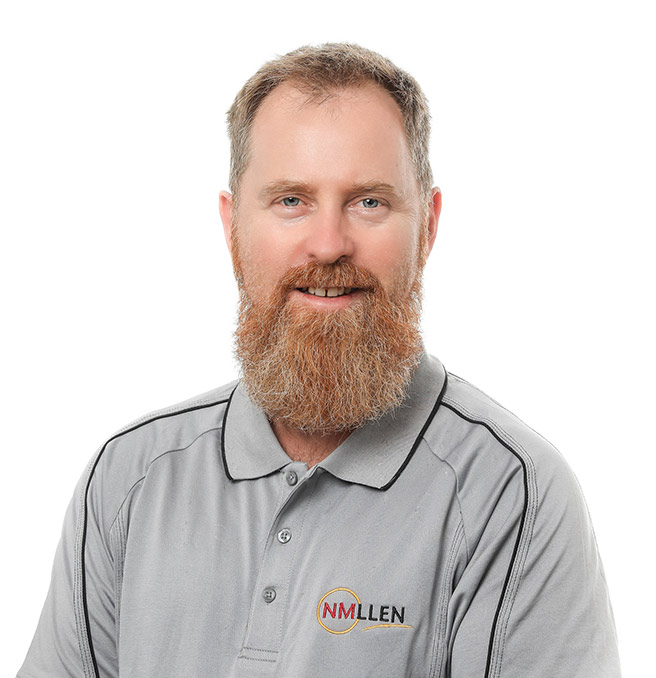
School to Work Coordinator
Dale Harvey
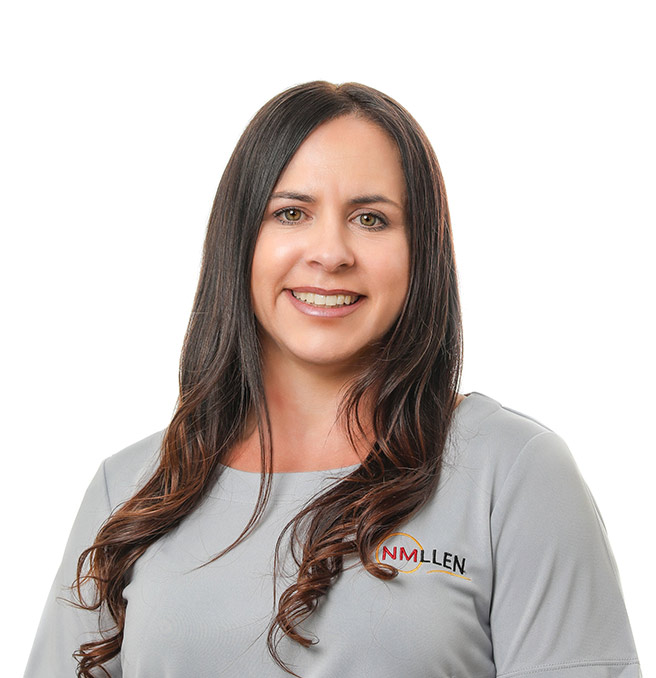
School to Work Project Officer
Natika Mitselburg
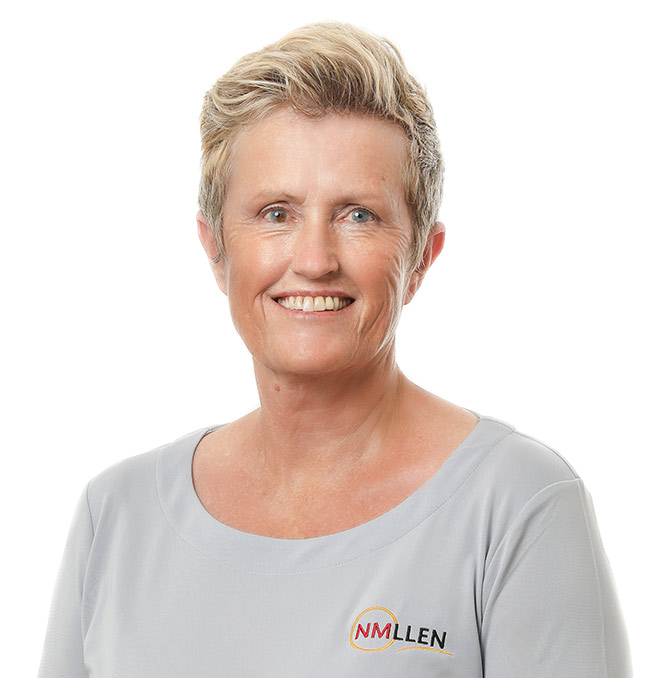
Administration Officer
Peta Maas
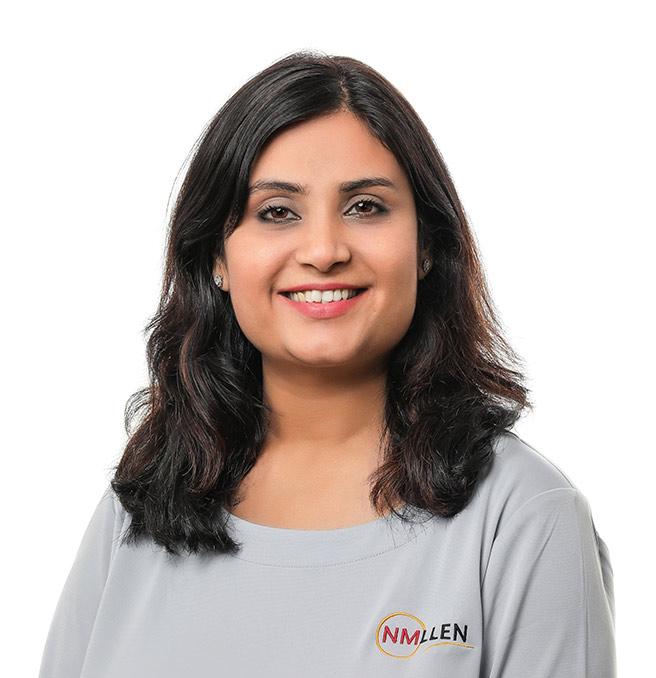
Marketing and Project Officer
Monica Trehan

Membership Form
NMLLEN brokers partnerships across the Northern Mallee region to help young people find successful pathways in education, training and employment. We have been engaging the local community through key partnerships such as FLO Connect, Flexible Learning Options in Schools, Ontrack Connect, Mallee Navigator, Mildura Region Trade Training Centre, STEM4Sunraysia, Structured Workplace Learning, Industry exposure and Sunraysia Careers Network.
You can support NMLLEN by becoming a member.
What's Involved?
NLLEN members can make a positive contribution in our community by improving outcomes for youth.
A membership provides:
- An opportunity to be a Committee member and influence the strategic plan and direction of NMLLEN.
- The ability to nominate and vote for members of the NMLLEN Committee of Management.
- Attend the Annual General Meeting and learn about relevant issues from interesting keynote speakers.
- Member only invitations to briefings, forums and workshops.
- Opportunities to network with key stakeholders, community groups and organisations.
We will also send you regular updates about key events and partnership initiatives.
How Do I Apply?
To become a NMLLEN Member please complete the membership request form below:
